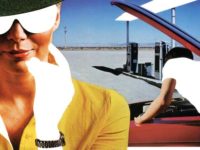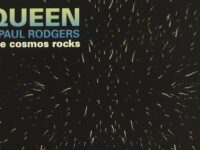For whatever reason, early in their careers both Bad Company and Foreigner were labelled by many fans and critics as playing a style of music called “arena rock.” Perhaps it was simply that both bands got successful playing simple, riff-oriented rock music mixed with varying degrees of soul, pop and technical ability. Or, perhaps after a while people just didn’t care enough to notice the difference. You know, “potato/ po-tah-toe” — and, since that analogy is as clear as an Idaho Norland, here are a few places where maybe it’s the gravy that makes all the difference in the world:
BAD COMPANY, DESOLATION ANGELS (1979) vs. FOREIGNER, 4 (1981): By this point, both bands were established acts in the rock ‘n’ roll business. But Bad Company’s previous album, Burning Sky, was their first to miss the Top 10, so it was essential that their next album would be a strong one. The single, “Rock and Roll Fantasy” helped take Desolation Angels up to near the top of the album charts.
Foreigner, on the other hand, had just ditched their two keyboardists and reconstituted themselves as a four-piece group, which now featured a more guitar-oriented hard rock sound rather than melodic pop. This didn’t prevent them from issuing the power ballad “Waiting for a Girl Like You” as one of the trio of singles (including rockers “Urgent” and “Juke Box Hero”) that sent 4 into multi-platinum sales figures. It’s tempting to wonder if the key here was stripping down to the four-piece guitar unit … same as Bad Company.
Winner: Desolation Angels has good songs and production, and Paul Rodgers’ bluesy vocal delivery is particularly strong, but Foreigner’s 4 crushes. Besides, whenever a band starts writing songs about what it’s like to be in a band (as in “Rock and Roll Fantasy”), it’s usually a sign that things have run their course.
BAD COMPANY, HOLY WATER (1990) vs. FOREIGNER, UNUSUAL HEAT (1991): It turned out the writing really was on the wall. Bad Company managed only one more album before they split up. Years later, when Mick Ralphs and Simon Kirke decided to put a new project together, their record label insisted they use the Bad Company name. As Paul Rodgers was busy performing with Jimmy Page in their short-lived project called the Firm, they recruited new singer Brian Howe — whose vocal style was less like Rodgers and more like Foreigner’s Lou Gramm.
As well, they added a keyboard player. And to produce their album Fame and Fortune they called in Keith Olsen, who had done Foreigner’s second album once upon a time. And even Foreigner’s Mick Jones himself made contributions in the song writing and production departments. Turned out that was all a little too obvious. By the time of the recording of Holy Water, they had dropped the keyboards and got Terry Thomas to be their new producer. It turned out to be a decent album, with Bad Company sounding a little more like themselves than they had been up to that point. Significantly, Holy Water has the distinction of being Bad Company’s last platinum-selling album.
Meanwhile, Foreigner was without the services of Lou Gramm, so he was replaced with vocalist Johnny Edwards to record 1996’s Unusual Heat, which was produced by … Terry Thomas. It had a solid AOR feel, and in spots sounded a bit like later-era Bad Company — which is to say, it sounded like …Foreigner. Or was it the other way around?
Winner: Gotta call this one a draw. Each one is good, but maybe both albums belong more to producer Terry Thomas than anyone would care to admit.
BAD COMPANY, COMPANY OF STRANGERS (1995) vs. FOREIGNER, CAN’T SLOW DOWN (2009): After Brian Howe left, Bad Company produced from out of the great rock ‘n’ roll magic hat a new singer named Robert Hart who sounded remarkably close to the long-absent Paul Rodgers. They also procured Rick Wills, better known as Foreigner’s long-term bassist. 1995’s Company of Strangers brought everything full circle: A whole album of new material that sounded more like the natural successor to the material of the original classic-era band.
Foreigner, down to last original member Mick Jones, found their own magic hat and came up with Kelly Hansen, an uncanny vocal doppelganger for Lou Gramm. This worked out great for when the band on the tour circuit — but in the studio, could Foreigner continue to live up to the musical standards of their biggest hits? Turned out the answer was yes: 2009’s Can’t Slow Down was the band’s first album of new material in 15 years, and it had the spirit and energy of their best work.
Winner: Hard to believe, but I’m going to have to call this another draw. Maybe the whole replacement singer thing is just a non-issue. Maybe the whole arena rock genre just lends itself to interchangeable players.
Or maybe the simple fact is that French fried or mashed, a spud’s a spud.
- How David Bowie’s ‘The Next Day’ Stripped Away All of the Artifice - March 15, 2023
- Why Deep Purple’s ‘Who Do We Think We Are?’ Deserves Another Listen - January 11, 2023
- In Defense of the Often-Overlooked Mott the Hoople - November 10, 2022




